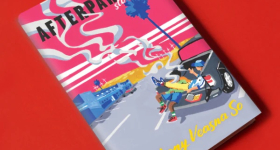35
There were three names listed under Cruz in the phone book, but I didn’t bother trying any of them. Ask Flaca. If Lourdes had been hostile to my call, Flaca, I knew, would hang up the minute she heard my name. I had always considered Penny their favorite; she was always the most admired in school, the one other girls strove to emulate. But Flaca was their backbone, the mainstay, the friend who dispensed favors and counsel. I decided to look for her in the one place I knew she would eventually be forced to return.
It was already dark when I left the diner, but I could have found my way to the palo blindfolded, even with all light stripped away. The Cruzes’ panadería was a flamingo pink storefront at the southernmost corner of a petite arc of businesses that included, among other things, a smoke shop and a laundromat. I parked the truck and climbed out as the barber was closing up for the night, unplugging the red and blue helix in the window, locking the door, rolling a hatched metal gate over the glass. He locked it, rattling the grille to make sure it was secured. Only the bakery stayed open late enough for workers returning from Sparks and Tehacama to drop off their lunch pails and tool kits at home, hunt their children from varied backyards and corral them to the bakery for tortas and Cokes. As I walked to the entrance, a large blue van pulled up to the curb, unloading a dozen women in identical pressed white uniforms. These women were Pomoc’s illusionists, soon to be ferried out to office buildings and casinos and hospitals in southern cities, armed only with plastic bottles and brooms to toil unseen, tasked with erasing our collective past. I followed them inside and lingered near the wall opposite a glass case full of pan dulces tucked into neat, full rows. The women placed orders for tacos de piña, puerquitos and coffee strong enough to power them through the evening into the pardoning dawn. Behind a small screen that separated her from customers, Maria’s short, corpulent figure bent to the glass case, shaking out one paper bag after another.
When I was a child, Lamb had brought me here so often that Maria often emerged from behind her veil‑like screen. She clasped me against her supple bulk, flattening dexterous, flour‑dusted fingers across my eyebrows and down the dark tails of my schoolgirl plaits, humoring Lamb with his awkward gringo patois while checking for my growth spurt that never seemed to arrive. Even after all these years her face was still full, a few strands of silver in her high, tight bun catching in the light. When the last of the uniformed women left, I unlatched myself from the wall and stepped up to the counter, searching Maria’s expression for some sense of recognition, an acknowledgment of the pigtailed tomboy who loved her. She nodded at me through the screen. “¿Qué quieres?”
“Is Christina here?”
“No.” Her reply was sharp, as if this was a question she’d been asked too often. Flaca’s business was growing, and it wasn’t hard to guess how many others might have shown up in recent months, seeking a dispensary.
“I just want to talk to her.”
“¿Quieres comprar algo?”
“I used to come here.” I held out my hand flat at my chest, indicating a child’s height. “This tall, overalls. I came with my grandfather. We sat over there.” I pointed to the corner table, the hard plastic chairs. She shrugged.
“You don’t remember me?” My voice sounded more desperate than I intended. What if I split my hair in braids again, if Lamb were beside me, if I clung to his rough hand the way I had then? Instead I pointed to a row of pink conchas behind the glass, as if nostalgia might stir Lamb’s dwindling appetite. “Cuatro, por favor.”
She reached for a pastry box and laid the conchas down like sleeping children. I paid and on my way out, held the door for a father shepherding twin girls inside, the pair of them in light‑up princess sneakers and vague, kittenish smiles. Outside, I stopped at the truck and slid the pastry box on the hood to fish the keys out of my pocket when out of the corner of my eye, I saw a mouse dart out from underneath a nearby car, scurrying along the side of the building to the dumpsters crowding the small back alley. Lamb and I had wandered there more than once to discard our trash, and I knew at the end of the alley lay the bakery’s kitchen where, during any weekday lull, Maria could be found chatting with any number of family members who cycled through to mix dough and answer the phone, transcribing elaborate cake orders. I settled the pastry box in the passenger seat of the truck before shutting the door and picking my way into the dark passage, edging past the dumpsters. Halfway down I could make out a square of light on the brick wall opposite, the top half of the kitchen’s Dutch door pushed open, giving off a backdraft of heat. I peeked in past the tall, silver rolling racks of pastries pulled away from the wall, the working counters covered with bags of yeast, mixing bowls, rows of sweet breads cooling on wire racks. A fan in the corner of the room rattled as it worked, its face pushed up toward the ceiling to keep from blowing flour into powdered mist. A slim girl, her back turned to me, pulled open the top door of an oven, sliding a baking tray inside. She shut it and moved to lean over the fan, shaking out the bottom of the tank top that clung to her, a red bandanna tying back her hair.
“Flaca,” I called her name softly. She made no movement to signal she heard, but a moment later, a familiar pair of hard, dark eyes pinned mine. She crossed the room and reached for the Dutch door, her face already forming a scowl. I took a step back, one foot into the dirt. A voice called out something indecipherable from the other room.
“Nadie, Mama,” Flaca called back. She jutted her chin at me. “What do you want?”
“I need to talk to you.”
“Me? About what?”
“What else? Penny.”
Flaca studied me with an expression I didn’t know how to read. She pushed the door open wider for me to catch, but once inside reached for me so quickly I didn’t have time to pull away. She caught my jaw in her firm grip, moving my face back and forth carefully in the light as if it were a ruby or disaster, something to be appraised. Her breath tickled my chin. This, the closest we had ever been to each other, even as girls.
“Penny didn’t do this,” she said flatly.
“God. Of course not.”
Flaca released me, moving away. It was 20 degrees hotter inside the kitchen, and the skin on my arms began to take on a thin sheen. The room smelled overwhelmingly sweet, the pastries baking in the double oven. I followed her back to the counter where she picked up a silver sifter, shaking powdered sugar over a rack of wedding cookies.
“Dime. You pissed someone off.”
“That’s not what I came to talk about.”
“Oh? What does Cale want to talk about?” She set down the sifter and lifted the tray, sliding it onto one of the rolling racks.
“Penny never showed up to work last night,” I spoke to her back. “Maybe you’d know where she is.”
“I have no idea.”
“But you’re always together.”
“So are you,” she said, turning to shoot me a look. “Lately.”
“Flaca, I went to her place. She didn’t answer. I used the spare. She wasn’t there but she left her cell phone behind. You don’t think that’s weird?”
“That Penny forgot her phone?”
“She didn’t forget it. And she hasn’t come back, not that I know of.”
“Where is it now?”
“What?”
“Her phone, Cale.”
I hesitated. All the drops Penny was making for her, the business Flaca would lose if Penny didn’t have it on her. There was no good way to deliver the news.
“I might have given it to the police.”
“What!”
“I’m sorry! That’s why I’m here.”
Flaca rubbed her face, smearing flour down her cheeks. The bandanna pulling back her hair brought her features into stark focus; the angle of her cheeks and chin, her nose a degree too sharp. I longed for Flaca’s mother to emerge from the front of the shop, to see mother and daughter standing side by side and compare their faces and hands, to ask how some things could be passed down so easily from one to another while other familial aspects were entirely betrayed.
“I didn’t know what else to do. Maybe it could help? I have a feeling —”
“A feeling!”
“Something could be wrong.”
“And what are the cops going to do?”
“Help find her?”
Flaca laughed. In all the time we had been in school together, I couldn’t recall the sound. I had never heard it, or I had heard it too often; it had dissolved into the childhood soundtrack of playground sounds along with the recess bell, the squeak of swing sets, the rhythmic whip of jump ropes slapping the blacktop. It cracked her face wide open, making her appear less birdlike, revealing a pliable warmth: a secret she had kept hidden inside herself all this time.
“You can’t help it, can you?”
“They’re probably going to call you,” I said.
“The cops aren’t going to do shit.”
“How do you know?”
“I know.”
I met her eyes. “If they don’t, who will?”
“Relax. Penny’s fine. If she went somewhere, she’s already back and pissed you went through her shit.”
“Where could she go? She doesn’t have a car.”
“She can get a ride.”
“You’re the one who gives her rides!”
“I’m not the only one.” She said it pointedly, something in it I was supposed to extract.
“Fine. Okay? Say she got a ride. Why hasn’t she come back yet?”
She looked heavenward, as if the answer was soon to arrive. “You don’t understand. She thinks she’s like you. But we’re not anything like you.”
“What’s so wrong with me, anyway?”
“For one thing, you’re dumb about things you never had to know about.”
I realized we were standing at a cross angle from one another, that I had one hand on my hip, that she had both on hers. I wanted to drop my hand, to tell her where I’d found Penny’s phone, and how, the rolls of cash in the freezer, what they might mean. If Penny was here, she would have trusted Flaca enough to tell her about the desert and the sand‑colored man, everything. If we were going to traffic in secrets, Flaca’s could rival us all. Flaca was surveying the pastries on the counters, a curious expression growing on her face, as if they were bizarre, diminutive creatures struggling toward life.
“What is it?”
“How long has it been?” Flaca asked.
“Since she’s been gone? I don’t know. She was supposed to be on shift the night before last. What time is it now?”
“Almost eight. So what is that? Two days? Three?”
I didn’t answer. She looked up, finally seeing me. The wheels in her mind, I could tell, were beginning to turn.
“You have an idea. Someplace she could be.”
“No,” she said. “But maybe I can find out.”
11
The other waitress, Clara, was awkward but gentle. A small woman, elf-like in stature, wispy platinum hair trimmed into a bob. In another life she was a nurse. I had no idea when that career began or ended but I imagined all manner of possibilities: a patient dying on the table, a lost child, an affair. The only token remaining from her previous identity was those pragmatic, rubber‑soled shoes, their mouseish echo trailing behind her on the waxed floors. The things Penny disliked about her were not eccentricities so much as personality traits that, when compiled, revealed a sensitivity, a tendency toward artistry. Clara remained quiet for hours, speaking only to request the music be lowered a degree, a piece of silverware polished a second time. Her requests were exacting, startling in a voice so gently delivered. Her singularity contributed to the diner’s familial quality. Jake’s was a place where a plate of scrambled eggs and a Monte Cristo might overshadow other problems, other lives. Junior arrived early every morning, bull‑shaped and perpetually vexed, and stayed long enough to collect receipts and the previous evening’s deposit. The rest he left to us. Besides Rico and Benoit, the other short‑order cook, it was a space ruled entirely by women. So maybe this is why the men came. Maybe we made the diner feel like a bosom, a warm lap. Maybe we made it feel like home.
By now I could walk from one end of the diner to the other with my eyes closed, the blueprint etched firmly in my mind. In the front of the diner were six square Formica tables; behind them, a long counter wrapped around the kitchen like a grin. The second stool over had a rip in the tobacco‑colored vinyl, the fourth worn so shiny it would split any day. All the stools squeaked when turned. To the left of the counter, a faint indentation remained in the floor where a wall once partitioned the space. I stood in the ghost of that room and imagined a family moving inside; what they talked about, how they spoke. Beneath four east‑facing windows, a coveted row of booths overlooked a patch of tangled juniper bush.
During the week, Penny worked the overnight shift and our paths crossed in the morning hours. I arrived at 10 and propped the front door to air the sharp odor of bleach. Penny counted tips while I tied my apron and checked stock. Luz and Flaca arrived together and smoked cigarettes on the porch, waiting for Penny to finish. When I saw them now, Luz chinned at me, but Flaca still tracked me with her eyes. I wondered what they did together so early in the morning before the bars were open; Pomoc’s list of diversions were few. There was only one kind of business I could imagine, and I was fairly certain it was one in which they were all developing a stake.
By the afternoon, when the sun seared the windows and the patrons skittered like wise animals seeking cool dark shelter, I walked onto the porch to smoke one cigarette after another, scanning the road for the next car that might turn off, white or blue or green, a minivan, a truck, a man, a couple. Here was the hour Lamb would return to our empty house; now he would open the fridge for a slice of cheese, now he would pour a cup of coffee into his favorite striped mug, smoke a cigarette, take his pills, read a book in the front room, then pull weeds in the yard. If I wasn’t there to call him to the table, would he eat his dinner just the same? It was as if I’d forgotten all the years between his old family and new, the hundreds of evenings he must have stood alone in front of a fridge or a bed or a mirror, evaluating how to proceed.
I counted the hours until dusk began to eat the light, her ravenous rose glow. I wiped down countertops and stacked dirty plates, refilled salt shakers and ketchup bottles, stocked napkins and paper‑covered straws. Rico slipped out of the kitchen after sunset, squatting in the back alley with a cigarette clamped between his teeth, staring at shadows in the dirt. When he returned I poured him a cup of coffee and watched him shake little blue pills out of the Ziploc bag Penny hid underneath the register every Monday morning before she left work. He crushed one under the back of a spoon and cut the line off the prep sink, bending his face to vacuum up the powder with a rolled dollar bill. After years of moving through the same small town with the same tired faces, we all knew the tweakers, potheads and pipe fiends; who might get high for fun and who needed a bump to get by — and who they called for their supply. In all that time, I had never known Penny to deal. It was Flaca with the reputation; Flaca in the girls’ bathroom at Vista, angling her sharp, lean figure over some blitzed‑out cheerleader by the sinks. So if Rico was getting drugs from Penny, Rico was actually getting his drugs from Flaca. For the most part, Pomoc’s chain of supply wasn’t of particular interest. It was just all those years I spent carefully watching, the habit slow to leave me.
By night the diner cooled off under the fans. Rico returned to his post behind the cook’s window. I went outside to plug in the Christmas lights, their diminutive bulbs twinkling in the window. The promise of Rico’s food once again lured peckish townies from their homes; they creaked over to the diner in rattling cars; they sat at the counter, where they could catch sight of Rico’s white shirt moving behind the stove, his battle‑scarred hands plating their meatloaf year after year, in all manner of heartbreak and joy. They made small talk, watching me roll forks and knives in paper napkins. They asked for pie.
I came to recognize the cross‑country truckers winding along the same routes, again and again.
These men tipped their hats and ate fast, then lingered over their last cup of coffee. I imagined other lives for them, wives and babies and dogs somewhere, awaiting their return.
Some nights I left before Penny arrived, driving home under a sky the impermeable color of spilled ink. I let myself into our shuttered home. The dogs slunk from the shadows to greet me in the hall, wagging cautious, loyal tails. I stroked their solemn heads, feeding them each a square of cheese. Their parting signal was a whisper, a kiss on the ear, a clap of my hands to send them off. I listened to them racing upstairs, the squeak of Lamb’s bedroom door. They settled at the foot of his bed like sentinels against the night, shielding him against all manner of danger we could not yet know.
Excerpt from A PRAYER FOR TRAVELERS by RUCHIKA TOMAR. Copyright 2019 by Ruchika Tomar. Excerpted by permission of Riverhead Books.
Author Website: http://www.ruchikatomar.com/
Author Photo Credit: Dan Doperalski
Cover Image: Courtesy of Riverhead Books










Comments